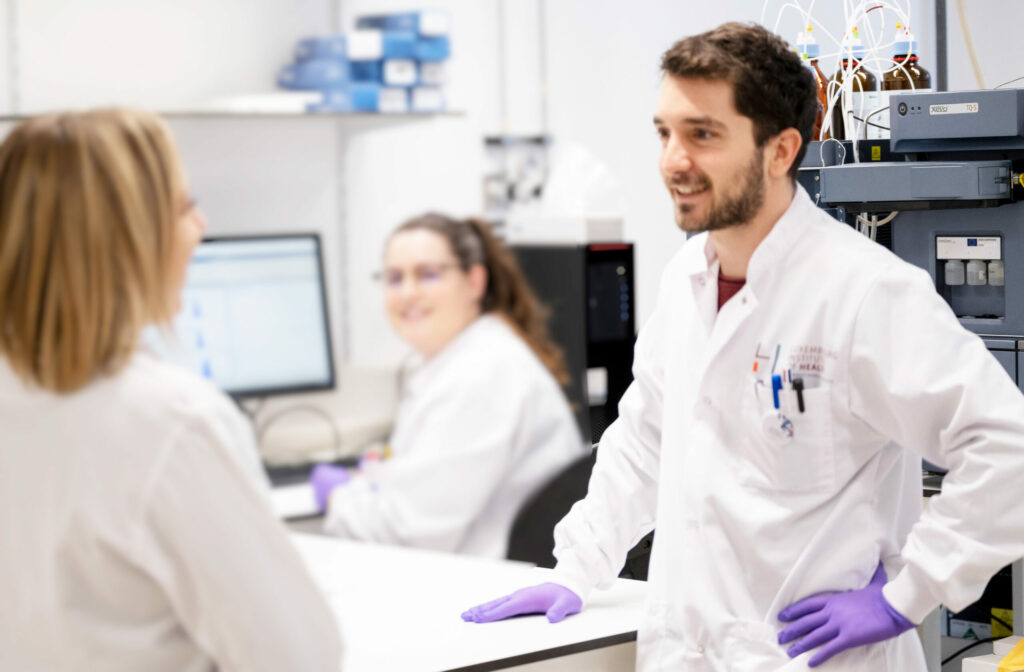
digital medicine
The Digital Medicine (dMed) group focuses on shaping and innovating personalised digital healthcare solutions, and understanding and evaluating the new benchmarks of a new ecosystem for digital medicine.
about the digital medicine group background

Digitalisation in medicine is changing the way of communication in medicine: New digital supported healthcare services complement the existing healthcare structures and procedures. Patient-centered healthcare services will address the patient’s needs, continuously monitor and accompany the individual patient journey, and provide clinical decision support for healthcare providers. “Real-life” healthcare data becomes available, and thus, it becomes a value. Its application in medicine has an enormous potential to reduce disease burden, improve healthcare and generate new solutions and services.
With a highly interdisciplinary team, the digital medicine group will address the questions of medical benefit, structural and procedural changes, as well as social acceptance of the resulting digital healthcare services. We want to understand how patient-centered, personalised healthcare technologies can be tailored to patients needs and integrated into the existing healthcare structures and procedures. We believe that shaping the rising age of digitalisation in medicine requires the development of new evaluation methods and benchmarking concepts to decipher “nice tools” from beneficial digital healthcare solutions. We want to enable digital medicine for patients and caregivers, innovative healthcare providers and payers.
activities
The digital medicine group will align with the digital health strategies in Luxembourg and develop digital health concepts that accelerate innovative digital healthcare technology solutions and health informatics. Thus, we will contribute to the innovations in digital healthcare solutions and improve healthcare, by enabling fast, efficient and transparent information for the patient and their healthcare team.
The digital medicine group started in March 2021 and is supported by the FNR-PEARL Program at the LCSB (Luxembourg Center for System Biology) at the University of Luxembourg, the LIH (Luxembourg Institute of Health) and the dMed Research Clinic at the CHL (Centre Hospitalier de Luxembourg).
With a strong focus on Parkinson’s disease, the PEARL project aims to understand how wearable sensors and smartphone-applications can support patients’ lives and be integrated into a multidisciplinary healthcare team.
We build on the existing Luxembourg Parkinson’s Study consisting of more than 1600 PD patients and healthy controls within the NCER-PD programme coordinated by Prof Rejko Krüger. Here, the ParkinsonNet concept already aims to connect patients, hospitals, primary care doctors and specialists, as well as therapists and other healthcare providers. The first digital healthcare solutions tested in this environment will mainly address mobility and gait, but also other relevant functional impairments in Parkinson’s patients, including cognitive impairment, sleep disturbances, and other non-motor functions. Our collaborating partners from industry and academia will provide their digital solutions and we will test their medical effect, but at the same time also the acceptance of patients and healthcare provider. We will also study the ethical, legal and social impact of these “data-driven” services in order to understand how the highest benefit can be reached with an acceptable risk for an individual patient and the society.
In the near future, the learnings from Parkinson’s will be transferred to other diseases. Digital Medicine aims to understand and shape the future of medicine. It is exciting to see how many solutions can be found when you ask the right question.
WATCH 📺 – Real world healthcare data in medicine – How to get it?
Highlighted Research Project
Projects & clinical trials
Featured team members
Scientific publications
-
Penetrance of Parkinson’s disease in GBA1 carriers depends on variant severity and polygenic background – 12/06/2025
-
Interpretable Machine Learning for Cross-Cohort Prediction of Motor Fluctuations in Parkinson’s Disease – 22/04/2025
-
Measuring Functional Impairments Using Novel Technologies – 19/09/2024
-
Patient perspectives on the use of digital medical devices and health data for AI-driven personalised medicine in Parkinson’s Disease – 04/12/2024
-
Preferences regarding Disclosure of Risk for Parkinson’s Disease in a Population-based Study – 01/01/2024
-
Genetically stratified Parkinson’s disease with freezing of gait is related to specific pattern of cognitive impairment and non-motor dominant endophenotype – 11/10/2024
-
Dopamine Pathway and Parkinson’s Risk Variants Are Associated with Levodopa-Induced Dyskinesia – 01/01/2024
-
Integrating digital gait data with metabolomics and clinical data to predict outcomes in Parkinson’s disease – 06/09/2024
-
Levodopa-induced dyskinesia in Parkinson’s disease – 01/09/2024
-
Mixed effects models but not t-tests or linear regression detect progression of apathy in Parkinson’s disease over seven years in a cohort – 24/08/2024
Related News

Job vacancies
There are no jobs matching this page at the moment. You can view all jobs via the button below.




